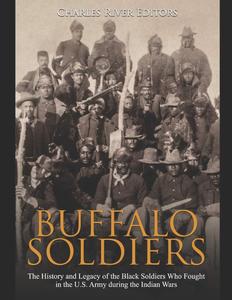
Free Download Buffalo Soldiers: The History and Legacy of the Black Soldiers Who Fought in the U.S. Army during the Indian Wars by Charles River Editors
English | December 20, 2019 | ISBN: 1678503088 | 51 pages | EPUB | 2.02 Mb
*Includes pictures
*Includes excerpts of contemporary accounts
*Includes a bibliography for further reading
During the Civil War, over 180,000 black men fought in volunteer units as part of the United States Colored Troop (USCT), but it was only after the end of it that they were allowed to enlist in the Regular Army. They did so in four segregated regiments, and they colloquially became known as Buffalo Soldiers. The evolution of these black units followed the course of the organization of the peacetime Regular Army. With the end of the Civil War came the demobilization of the millions of men who had volunteered to fight on behalf of the Union, including the USCT, which disbanded in late 1865. The first draft of a bill setting the organization of the Army sent to the House on March 7, 1866 called for the establishment of eight infantry regiments to be staffed by veterans of the USCT, but the legislation lacked similar provisions for black cavalry units. When the bill got to the Senate for approval, Senator Benjamin Wade succeeded in having a provision added that authorized black cavalry units.
The bill that passed on July 28, 1866 authorized a total of 10 regiments of cavalry and 45 regiments of infantry, and in 1867, the Regular Army raised two regiments of black cavalry, designated the 9th (Colored) Cavalry and the 10th (Colored) Cavalry. In addition, the Army raised four regiments of black infantry: the 38th (Colored) Infantry, the 39th (Colored) Infantry, the 40th (Colored) Infantry, and the 41st (Colored) Infantry. Ultimately, however, the number of black regiments did not stay at six for very long, because in 1869 there was a further reduction in the size of the Regular Army, with the number of infantry regiments reduced to 25. As part of the reduction, the number of black regiments was reduced from four to two, so the 38th and 41st were reorganized as the 25th (Colored) Infantry, and the 39th and 40th were reorganized as the 24th (Colored) Infantry. The enlistment in both the cavalry and infantry was for five years, with soldiers being paid $13 a month, plus room, board, and clothing.
Of course, these units are now known for the nickname attached to them, but exactly where the nickname Buffalo Soldiers came from is a subject of some dispute. Dr. Walter Hill wrote, "According to Benjamin H. Grierson, Colonel, 10th Cavalry, 1867 to 1890, the 10th acquired the name 'Buffalo Soldiers' during the 1871 campaign against the Comanches in the Indian Territory. Grierson said that the Comanches respected the soldiers' tireless marching and dogged trail skills. They had earned the name of the rugged and revered buffalo. The 10th made the 'Buffalo' its regimental coat of arms years later, but the term 'Buffalo Soldiers,' became synonymous with both the 9th and 10th units." The term appeared in public for the first time in 1873, in reference to the 10th Cavalry, in a letter from Mrs. Frances M.A. Roe to a popular magazine. She wrote, "The officers say that the Negroes make good soldiers and fight like fiends...the Indians call them 'buffalo soldiers' because their woolly heads are so much like the matted cushion that is between the horns of the buffalo. Others believe that the nickname originated from the Cheyanne. Another possible source came from the Apaches for the buffalo coats they wore in the winter."
Buffalo Soldiers: The History and Legacy of the Black Soldiers Who Fought in the U.S. Army during the Indian Wars examines how the regiments were raised, and what their service entailed over the course of several decades. Along with pictures depicting important people, places, and events, you will learn about the Buffalo Soldiers like never before.
